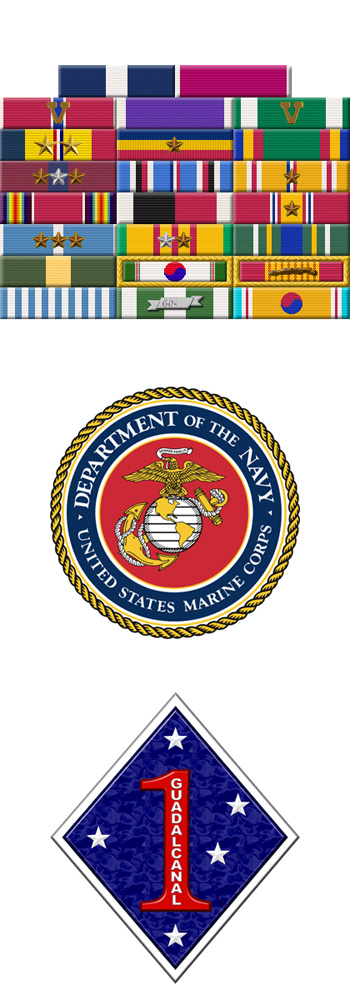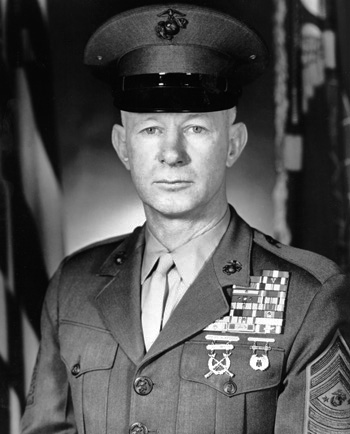
|
Clinton A. Puckett |
 |
|||
| Rank, Service | ||||
Sergeant Major of the Marine Corps, U.S. Marine Corps |
||||
| Veteran of: | ||||
|
||||
| Tribute: | ||||
Clinton Puckett was born on March 6, 1926, in Waurika, Oklahoma, and grew up in Roswell, New Mexico. He enlisted in the U.S. Marine Corps on February 18, 1944, and after completing basic training was assigned to the 5th Marine Division at Camp Pendleton, California, in May 1944. Pvt Puckett landed with the division on Iwo Jima on February 19, 1945, and served throughout the Battle of Iwo Jima, returning to the U.S. in May 1945 where he served as a military policeman at Camp Pendleton until receiving an honorable discharge on May 17, 1946. PFC Puckett returned to active duty with the Marine Corps on July 12, 1947, and served at San Diego, California, until December 1947, when he was assigned to the heavy cruiser USS Columbus (CA-74). Cpl Puckett served aboard the Columbus from December 1947 to January 1950, and then served as a drill instructor at Marine Corps Recruit Depot San Diego from February 1950 to June 1951. His next assignment was to Camp Pendleton, where he prepared to deploy to Korea from July to October 1951. Sgt Puckett served in combat in Korea with Company G, 3rd Battalion, 5th Marines from October 1951 to September 1952, and then served at Camp Pendleton from October 1952 to April 1953. After completing the new Drill Instructor School at MCRD San Diego, he remained on as an instructor until July 1955, when he deployed to Korea as an advisor to the South Korean Marine Corps with the Marine Corps Component of the Navy Advisory Group there. Sgt Puckett left Korea in September 1956, and then served as First Sergeant and regimental operations chief with the 2nd Infantry Training Regiment at Camp Pendleton until April 1959. His next assignment was as First Sergeant of Marine Barracks, Pearl Harbor, Hawaii, from April 1959 to May 1962, followed by service as Sergeant Major of the 1st Reconnaissance Battalion, 1st Marine Division at Camp Pendleton from May 1962 to April 1964. SgtMaj Puckett next served as Sergeant Major of the 3rd Battalion, 5th Marines (redesignated 1st Battalion, 3rd Marines in September 1965) at Camp Pendleton from April 1964 to November 1965, and then deployed to South Vietnam from November 1965 to September 1966. He then served on the Inspector-Instructor Staff of the 3rd Battalion, 23rd Marines, 4th Marine Division at San Bruno, California, from October 1966 to November 1968, followed by another deployment to South Vietnam as Sergeant Major of the 7th Marines, 1st Marine Division from December 1968 to September 1969. SgtMaj Puckett served at Camp H.M. Smith, Hawaii, from September 1969 to July 1970, and then served as Personnel Sergeant Major with Headquarters U.S. Marine Corps in the Pentagon from July 1970 until he became the 6th Sergeant Major of the Marine Corps on February 1, 1973. He retired from the Marine Corps in this position on June 1, 1975. Clinton Puckett died on September 3, 2002, and was buried at Arlington National Cemetery. |
||||
|
||||

